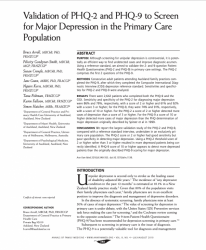
PURPOSE Although screening for unipolar depression is controversial, it is potentially an efficient way to find undetected cases and improve diagnostic acumen. Using a reference standard, we aimed to validate the 2- and 9-question Patient Health Questionnaires (PHQ-2 and PHQ-9) in primary care settings. The PHQ-2 comprises the first 2 questions of the PHQ-9.
METHODS Consecutive adult patients attending Auckland family practices completed the PHQ-9, after which they completed the Composite International Diagnostic Interview (CIDI) depression reference standard. Sensitivities and specificities for PHQ-2 and PHQ-9 were analyzed.
RESULTS There were 2,642 patients who completed both the PHQ-9 and the CIDI. Sensitivity and specificity of the PHQ-2 for diagnosing major depression were 86% and 78%, respectively, with a score of 2 or higher and 61% and 92% with a score 3 or higher; for the PHQ-9, they were 74% and 91%, respectively, with a score of 10 or higher. For the PHQ-2 a score of 2 or higher detected more cases of depression than a score of 3 or higher. For the PHQ-9 a score of 10 or higher detected more cases of major depression than the PHQ determination of major depression originally described by Spitzer et al in 1999.
CONCLUSIONS We report the largest validation study of the PHQ-2 and PHQ-9, compared with a reference standard interview, undertaken in an exclusively primary care population. The PHQ-2 score or 2 or higher had good sensitivity but poor specificity in detecting major depression. Using a PHQ-2 threshold score of 2 or higher rather than 3 or higher resulted in more depressed patients being correctly identified. A PHQ-9 score of 10 or higher appears to detect more depressed patients than the originally described PHQ-9 scoring for major depression.
Keywords: Depression, physicians, family, mass screening
| Attachment | Size |
|---|---|
| 132.56 KB |

